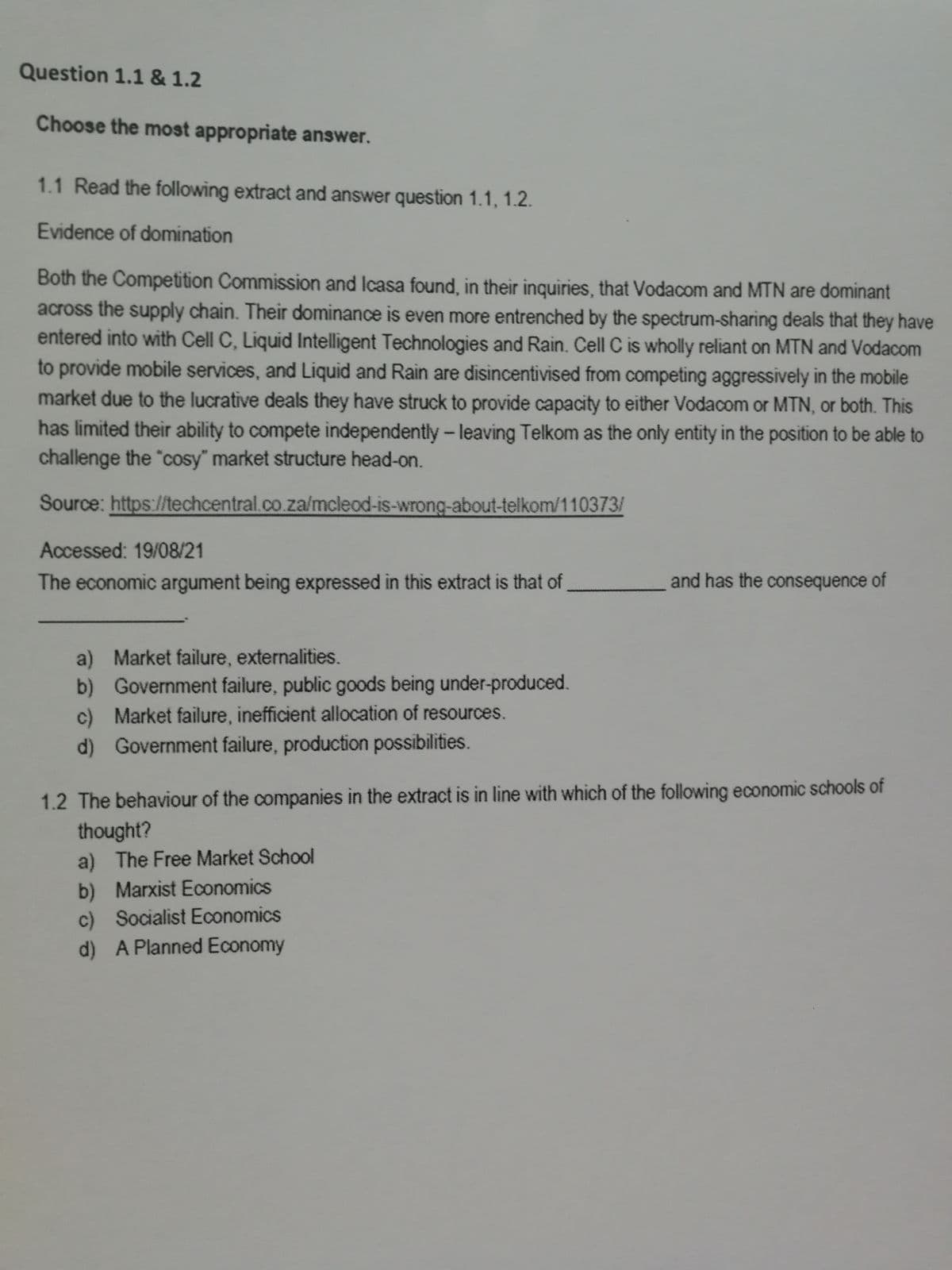Choose the most appropriate answer. 1.1 Read the following extract and answer question 1.1, 1.2. Evidence of domination Both the Competition Commission and Icasa found, in their inquiries, that Vodacom and MTN are dominant across the supply chain. Their dominance is even more entrenched by the spectrum-sharing deals that they have entered into with Cell C, Liquid Intelligent Technologies and Rain. Cell C is wholly reliant on MTN and Vodacom to provide mobile services, and Liquid and Rain are disincentivised from competing aggressively in the mobile market due to the lucrative deals they have struck to provide capacity to either Vodacom or MTN, or both. This has limited their ability to compete independently-leaving Telkom as the only entity in the position to be able to challenge the "cosy" market structure head-on. Source: https://techcentral.co.za/mcleod-is-wrong-about-telkom/110373/ Accessed: 19/08/21 The economic argument being expressed in this extract is that of, and has the consequence of a) Market failure, externalities. b) Government failure, public goods being under-produced. c) Market failure, inefficient allocation of resources. d) Government failure, production possibilities. 1.2 The behaviour of the companies in the extract is in line with which of the following economic schools of thought? a) The Free Market School b) Marxist Economics c) Socialist Economics d) A Planned Economy
Choose the most appropriate answer. 1.1 Read the following extract and answer question 1.1, 1.2. Evidence of domination Both the Competition Commission and Icasa found, in their inquiries, that Vodacom and MTN are dominant across the supply chain. Their dominance is even more entrenched by the spectrum-sharing deals that they have entered into with Cell C, Liquid Intelligent Technologies and Rain. Cell C is wholly reliant on MTN and Vodacom to provide mobile services, and Liquid and Rain are disincentivised from competing aggressively in the mobile market due to the lucrative deals they have struck to provide capacity to either Vodacom or MTN, or both. This has limited their ability to compete independently-leaving Telkom as the only entity in the position to be able to challenge the "cosy" market structure head-on. Source: https://techcentral.co.za/mcleod-is-wrong-about-telkom/110373/ Accessed: 19/08/21 The economic argument being expressed in this extract is that of, and has the consequence of a) Market failure, externalities. b) Government failure, public goods being under-produced. c) Market failure, inefficient allocation of resources. d) Government failure, production possibilities. 1.2 The behaviour of the companies in the extract is in line with which of the following economic schools of thought? a) The Free Market School b) Marxist Economics c) Socialist Economics d) A Planned Economy
Principles of Economics 2e
2nd Edition
ISBN:9781947172364
Author:Steven A. Greenlaw; David Shapiro
Publisher:Steven A. Greenlaw; David Shapiro
Chapter9: Monopoly
Section: Chapter Questions
Problem 1SCQ: Classify the following as a government-enforced barrier to entry, a banker to entry that is not...
Related questions
Question
100%

Transcribed Image Text:Question 1.1 & 1.2
Choose the most appropriate answer.
1.1 Read the following extract and answer question 1.1, 1.2.
Evidence of domination
Both the Competition Commission and Icasa found, in their inquiries, that Vodacom and MTN are dominant
across the supply chain. Their dominance is even more entrenched by the spectrum-sharing deals that they have
entered into with Cell C, Liquid Intelligent Technologies and Rain. Cell C is wholly reliant on MTN and Vodacom
to provide mobile services, and Liquid and Rain are disincentivised from competing aggressively in the mobile
market due to the lucrative deals they have struck to provide capacity to either Vodacom or MTN, or both. This
has limited their ability to compete independently-leaving Telkom as the only entity in the position to be able to
challenge the "cosy" market structure head-on.
Source: https://techcentral.co.za/mcleod-is-wrong-about-telkom/110373/
Accessed: 19/08/21
The economic argument being expressed in this extract is that of
and has the consequence of
a) Market failure, externalities.
b) Government failure, public goods being under-produced.
c) Market failure, inefficient allocation of resources.
d) Government failure, production possibilities.
1.2 The behaviour of the companies in the extract is in line with which of the following economic schools of
thought?
a) The Free Market School
b) Marxist Economics
c) Socialist Economics
d) A Planned Economy
Expert Solution
This question has been solved!
Explore an expertly crafted, step-by-step solution for a thorough understanding of key concepts.
Step by step
Solved in 3 steps

Knowledge Booster
Learn more about
Need a deep-dive on the concept behind this application? Look no further. Learn more about this topic, economics and related others by exploring similar questions and additional content below.Recommended textbooks for you

Principles of Economics 2e
Economics
ISBN:
9781947172364
Author:
Steven A. Greenlaw; David Shapiro
Publisher:
OpenStax



Principles of Economics 2e
Economics
ISBN:
9781947172364
Author:
Steven A. Greenlaw; David Shapiro
Publisher:
OpenStax



Economics: Private and Public Choice (MindTap Cou…
Economics
ISBN:
9781305506725
Author:
James D. Gwartney, Richard L. Stroup, Russell S. Sobel, David A. Macpherson
Publisher:
Cengage Learning

Microeconomics: Private and Public Choice (MindTa…
Economics
ISBN:
9781305506893
Author:
James D. Gwartney, Richard L. Stroup, Russell S. Sobel, David A. Macpherson
Publisher:
Cengage Learning
